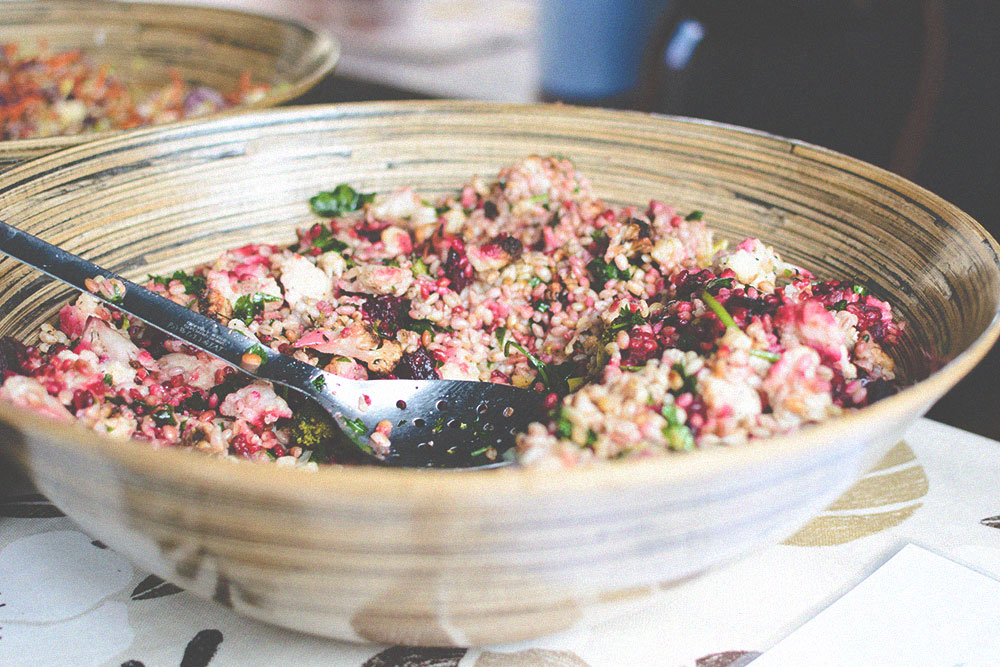Fear-mongering has become all too common in the diet world, disrupting our natural capabilities to simply eat and nourish ourselves. If you’ve watched the latest popular documentary on veganism, take a closer look at its underlying meaning.
BY: RACHAEL HARTLEY, RD, LD, CDE
Ever since a certain fear-mongering documentary came out on Netflix, many questions are being asked about veganism. And since Netflix likes to suggest more fear-mongering documentaries after you watch one fear-mongering documentary, more questions about “clean eating” and “sugar addiction” may be coming up as well.
Just to preface the rest of this article, there is absolutely nothing wrong with going vegan, if done for the right reasons.
As a whole, our world would be a lot better off, both our personal health and the environment’s, if we ate less meat. While there are health reasons to at least include some animal foods in your diet (Omega 3s, B12, and other nutrients to support brain health, for example), if you’ve taken a deep dive into examining your ethics and choose not to, it’s not life or death.
The real problem is with documentaries that harness fear, inaccurately portray, or wildly exaggerate science to scare people into making changes that: A) rarely last, B) fuel disordered eating, and C) trigger eating disorders in susceptible people.
Let’s say you’ve just watched a fear-mongering documentary on diet and nutrition. You’re feeling scared. You’re feeling anxiety over every food you usually eat. You’re ready to jump in and make a huge change to your diet, without really thinking it through.
Time to detox your brain.
What most of these documentaries do is take extremes in eating and use that to scare people who don’t currently eat that way. Take the sugar documentary from a few years back for example. They highlighted a bunch of kids who were suffering from diet-related diseases at a young age and showed how much sugar they were eating. It was really sad, and no doubt, a lot of parents probably saw it and thought:
Oh my God, my child eats Fruity Pebbles too! Are they going to develop diabetes at 12??
But many highlighted families in the film had a lower socioeconomic status, and presumably, most people watching a documentary on Netflix are likely middle or upper class, or, at the very least, food secure.
Seems a bit disingenuous to shame people who are eating poorly because they don’t have access to healthy food, and use their struggles to scare people who do, don’t you think?
Now, let’s take a step back and look at the big picture of your eating. If you regularly eat plant-based meals, include veggies and grains in your meals, and generally eat a wide variety of foods, it’s highly unlikely you’re eating enough animal food to be harmful. If you cook at home, don’t guzzle soda or sugar sweetened beverages all day, snack on a variety of whole foods as well as some convenience snacks, and aren’t restricting sugar (which we know can trigger overconsumption), then it’s highly unlikely you’re eating enough sugar to be harmful. Just because there’s some shred of truth in the documentaries, that doesn’t mean we have to take eating to the extreme and back.
While ethical issues around meat consumption are absolutely real, you don’t have to be all or nothing.
For example, recycling is really important. I’m the kind of person who will take stuff out of your garbage can to make sure it’s recycled. But if I throw away a can because I can’t find a recycling bin, I’m not going to freak out and feel so guilty about it that I stop recycling entirely.
The best thing that you can do is make each food decision in the moment rather than setting broad rules that may not be realistic 100% of the time. If being vegan truly aligns with your values, then be a vegan.
But be sure you’re doing it for the right reason, and not because you were scared into it.
Adapted from the original article.
HEADER IMAGE: JAKUB KAPUSNAK
Rachael Hartley, RD, LD, CDE is a private practice dietitian, food enthusiast, and nutrition expert based in Columbia, SC. By guiding others to rediscover the joy of nourishment rather than deprivation, Rachael helps men and women alike improve their health and well-being through delicious whole food recipes and practical advice through intuitive eating.

